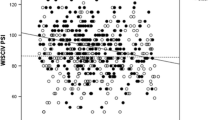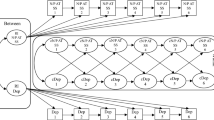Abstract
The relationship between cognitive tempo and 12 behavior problems in children was investigated. The Matching Familiar Figures test (MFF) was administered to 150 children aged 6 to 11, and the Child Behavior Checklist was completed by their parents. Fast, inaccurate, impulsive responses on the MFF were associated with hyperactivity, but MFF scores were not associated with 11 other behavior problems. Contrary to a previous report by Schwartz, Friedman, Lindsay, and Narrol (1982), cognitive tempo was not related to childhood depression. The findings are discussed in terms of a distinction between cognitive deficiency and cognitive distortion.
Similar content being viewed by others
References
Achenbach, T. M. (1978). The Child Behavior Profile: I. Boys aged 6–11.Journal of Consulting and Clinical Psychology, 46 478–488.
Achenbach, T. M., & Edelbrock, C. S. (1979). The Child Behavior Profile: II. Boys aged 6–11 and girls aged 6–11 and 12–16.Journal of Consulting and Clinical Psychology, 47 223–233.
Campbell, S. B., Douglas, V. I., & Morgenstern, G. (1971). Cognitive styles in hyperactive children and the effect of methylphenidate.Journal of Child Psychology and Psychiatry, 12 55–67.
Douglas, V. I., Parry, P., Marton, P., & Garson, C. (1976). Assessment of a cognitive training program for hyperactive children.Journal of Abnormal Child Psychology, 4 389–410.
Horowitz, L. M., Inouye, D., & Siegelman, E. Y. (1979). On averaging judges' ratings to increase their correlation with an external criterion.Journal of Consulting and Clinical Psychology, 47 453–458.
Kagan, J. (1966). Reflection-impulsivity: The generality and dynamics of conceptual tempo.Journal of Abnormal Psychology, 71 17–24.
Kendall, P. C. (1981). Cognitive-behavioral interventions with children. In B. B. Lahey & A. E. Kazdin (Eds.),Advances in clinical child psychology (Vol. 4). New York: Plenum Press, 1981.
Kendall, P. C., & Braswell, L. (1982). Cognitive-behavioral self-control therapy for children: A components analysis.Journal of Consulting and Clinical Psychology, 50 672–689.
Kendall, P. C., & Fischler, G. L. (1984). Behavioral and adjustment correlates of problemsolving: Validational analyses of interpersonal cognitive problem-solving measures.Child Development, 55 879–892.
Meichenbaum, D. H., & Goodman, J. (1971). Trainig impulsive children to talk to themselves: A means of developing self-control.Journal of Abnormal Psychology, 77 115–126.
Salkind, N. J., & Wright, J. C. (1977). The development of reflection-impulsivity and cognitive efficiency.Human Development, 20 377–387.
Schwartz, M., Friedman, R., Lindsay, P., & Narrol, H. (1982). The relationship between conceptual tempo and depression in children.Journal of Consulting and Clinical Psychology, 50 488–490.
Author information
Authors and Affiliations
Additional information
Collection of these data was supported by the National Institute of Mental Health (RO 1 MH34623-01) in the form of a grant to study “Interpersonal Cognition and Behavior.”
Rights and permissions
About this article
Cite this article
Fuhrman, M.J., Kendall, P.C. Cognitive tempo and behavioral adjustment in children. Cogn Ther Res 10, 45–50 (1986). https://doi.org/10.1007/BF01173382
Issue Date:
DOI: https://doi.org/10.1007/BF01173382




